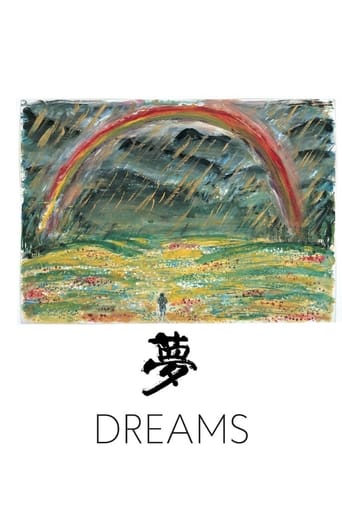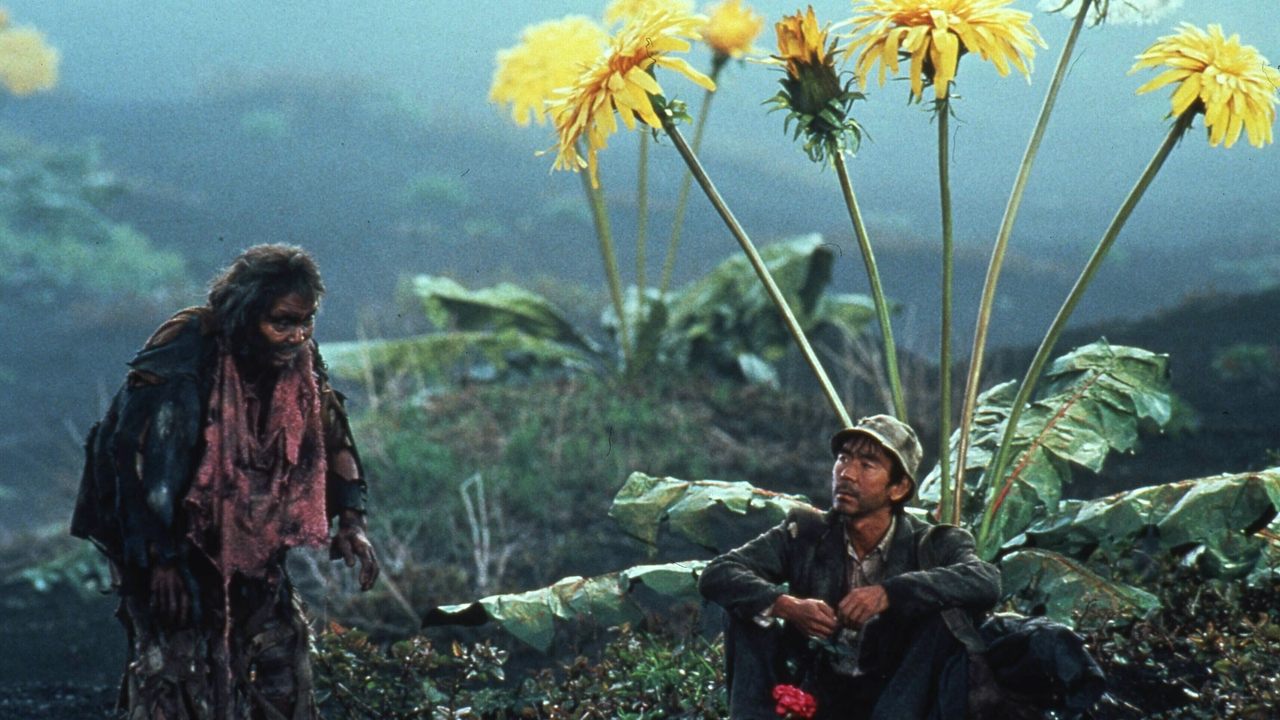gavin6942
A collection of tales based upon the actual dreams of director Akira Kurosawa.The film received mixed reviews, earning a Rotten Tomatoes approval rating of only 55%. I think this is a shame. Although Kurosawa is better known for his samurai stories, this was one of the last stories he put on film and I would say it is among his best. The incredible use of color and costuming alone makes this worth seeing.The segment that will probably stand out most for Americans is the vignette with Vincent vanGogh, played by Martin Scorsese. This was an interesting bit of casting, but more interestingly was the way the story unfolds at this point, where nature is shown to be art, both figuratively and literally. It is a quite a beautiful short film in its own right.
gothic_a666
'Dreams' is a highly personal journey through the inner landscape of Kurosawa's mind. But it is also an oneiric reflection on Japan itself. True to the nature of dreams the movie is comprised of vignettes, most of which unconnected, a collection of threads of imagery that are stand alone and gain a greater sense of diversity when seen as a whole. This variety is deep and eccentric, it goes from traditional lore in the wedding of the Fox spirits to frightful scenes of nuclear disaster as Mount Fuji becomes a red cone without forgetting a gorgeous incursion into Van Gogh's vision.While artistically bold and faultless in the crafting of a dreamy mood this is not an escapist movie of pure fantasy. For there is always space of nightmares in the world of dreams. Collective phantoms that are very close to the Japanese identity reappear in novel and unpredictable ways. The horrors of the war are represented in a dead platoon that does not know of its own demise; the ever present dread of a nuclear holocaust mingles with the national icon of Fujiyama and provides ground for philosophical considerations through the narrative vehicle of folk traditions; ecological concerns in a society that is increasingly more dependent on technology are soothed by a bucolic alternative of a simpler life.Through the medium of strong impressive images Kurosawa interprets himself and his country to the world with stunning results. The movie is the culminating achievement of a master for if there ever was a masterpiece 'Dreams' is one.
danjakubik
"Akira Kurosawa: Dreams" Written and Directed by: Akira Kurosawa Japan1990 * * * 1/2I haven't seen this film for many years. I saw it theatrically, during it's 1990 release and was impressed at the time.I've seen a number of other significant Kurosawa films and am aware of his stature and influence in cinema history. This is a visually brilliant, imaginative and interesting film, a collection of eight dreams of Kurosawa. I found the film to be beautiful and meditative.Critics were divided on this 28th and personal film, in the long and uneven career of acclaimed filmmaker Akira Kurosawa. All eight dreams are visually stunning and imaginatively created. The film as a whole, has been criticized by some critics as sentimental and preachy. The last three dreams concern the destruction of man and nature by human made nuclear radiation accidents and our over reliance on technology and convenience. Let's look at Kurosawa, when he made this film. This man is 80 year old and has made some very significant, well praised and influential films during his lifetime, such as "The Seven Samurai" and "Ran". "Dreams", was the next film, made by Kurosawa, five years after the highly acclaimed film "Ran". So it was obvious to make comparisons between the themes and styles of the two films. Kurosawa once tried to commit suicide, which, of course, is a classic tale of many of the great artists of human history, who sometimes bordered on insanity. When I first saw this film. I was impressed by it's visual beauty and imagination. Some of the tone of some of the dreams of the film, some critics found reason to disfavor. The Japanese are known for being a spiritual and nature orientated culture and religion (Shinto and Buddhist). "The Tunnel", "Fuji in Red", "The Weeping Demon" and "Watermill Village" are the final four dreams of the film and the ones which show signs of being preachy. The earlier dreams, showing youth, can be called sentimental. The concept of the film was misunderstood and under-appreciated by some serious film critics, including Jonathan Rosenbaum of The Chicago Reader, a film critic I have held in high esteem for some years. Two of the dreams are about a classic and recurring Japanese theme since the 1950's: the dangers of man made nuclear radiation accidents. I especially liked the peaceful, nature, spiritual ending of the film. Kurosawa made two more films after this and died in 1997.Overall, this visually brilliant and imaginative film, made by a legendary master influential filmmaker, does have some unfortunate weaknesses: The concept of portraying one's dreams, no matter how well visually realized, is a highly personal subject and makes for a slightly dull subject, for a two hour long feature film, critics included. It's a little sentimental and preachy, but in a manner, I didn't have a problem with. Great concepts, excellent technique and execution, by an acknowledged film making master, but a film entirely based on someone's dreams and from the perspective of an 80 year old filmmaker, is not really the best combination, in the end.
Luis Guillermo Cardona
Akira Kurosawa was a good man. East-blooded, able to see beyond the surface, transcended the skin and sharpened senses to understand the greatness of our world. He saw, recognized and pulsed with the natural beauty that the world has to offer and felt, shared and respected the man who carries depth, dignity and love, with the rest of his fellows, and put his life in service of an art sacred and clean for him, with which recorded his feelings, hopes and fears. In 1990, Kurosawa had already created a cinematographic work which included 28 films, most of them of profound significance and an occasional small lakes such as have any other artist, therefore, not always the inspiration and / or conditions, they get found at its highest point. However, already had earned the Golden Lion and Silver Lion in Venice, had received the Oscar for best foreign film, and two Silver Bears at the Berlin Film Festival, also recognized his virtuosity.He had already overcome the worst existential crisis, and had won the recognition of large European and American producers who funded his latest projects.Thus, with the support of Steven Spielberg and George Lucas, then came "Akira Kurosawa's Dreams," a film very visually beautiful, full of illusion and disillusion, innocent and sweet as if you tell your child more intimate, and hope to awaken the conscience of man of the century, which is about to completely ruin the permanence of the human being, this amazing home that we gave by bequest. Eight vindicate dreams and magic of nature, which speak of the forces that exist beyond the senses, that we warn against nuclear disaster, and remind us of the majesty and security that, in principle, we were given away. The result is a film with meaning and worthy of a tortured writer who, by dint of perseverance, kept alive the hope in man.



 AD
AD





